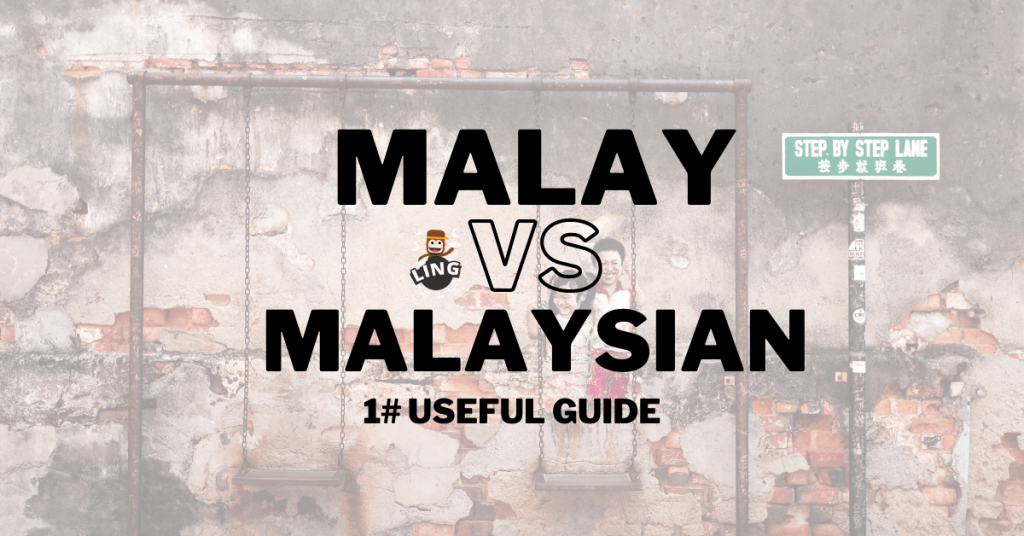Have you ever heard people using Malay, Malaysian and Malayan all in one sentence? If the use of these terms confuses you, this post is just for you! Get to know Malay vs Malaysian more now.
Interested to learn about Malay but do not know where to start? We highly recommend that you focus on understanding the basics and that includes the terms we have stated above. First, let’s get ‘Malaysia‘ out of the way. Malaysia is the name of a country. The pronunciation should sound like this: muh-LAY-shuh
If anyone unfamiliar with Malaysia asks me where it is, I always answer it like this: “Do you know Thailand? How about Singapore? Well, Malaysia is somewhere between Singapore, and Thailand.” That is honestly the simplest way to explain where Malaysia is on the world map.
Malaysia is a beautiful country with many things to offer. Malaysia’s tourism slogan goes like this: “Malaysia, Truly Asia”. That phrase is a good summary of what Malaysia is, you can get a taste of many parts of Asia in Malaysia.
In this post, I would like to shine a light on many of you who found these terms confusing. We will be looking at the meaning of the terms, Malay Vs Malaysian, and also an in-depth discussion on these terms.
Malay Vs Malaysian Vs Malayan
Let’s have a look at the terms involved.
Malay
First, we have Malay. in simpler terms, Malay is the race or the ethnic of the people who lived in the same land before the evasion of the west. To be more specific, it is a term used to describe the people of the Malay Archipelago who have occupied the Malay peninsula since the prehistoric period. They come from a variety of ethnic, linguistic, and cultural backgrounds, but they all speak Austronesian languages.
Malaysian Malay
There is even a conformation on the definition of being Malay in the Malaysian Constitution.
- a person who practices the religion of Islam, who speaks Malay, who conforms to Malay customs
- AND who has origins within the Federation of Malaysia or Singapore before Independence on 31 August 1957, or who is the child of at least one parent born among the population then belonging to the Federation of Malaysia.
Malay culture and customs mentioned above include speaking the national language of Malaysia which is the Malay language (also known as Bahasa Melayu), wearing traditional Malay dress, and many other aspects.
As you can observe above, being Malay does not mean you are limited to being a Malaysian. Malays can be found in many neighboring countries, hence why you can classify Malay subgroups into Malaysian Malay, Singaporean Malay, Bruneian Malay, and so on.
Malay Language
The word Malay can also be referred to in the Malay language. The Malay language was once the lingua franca in the era of the Malacca Sultanate. If you want to learn more about the amazing Bahasa Melayu, you can go here.
Malaysian
Malaysian referees to the people with the nationality of Malaysia. This also means you can be Malaysian without being Malaysian- by being born in Malaysia.
The word Malaysian is also used as an adjective when describing anything related to Malaysia. For example, the Malaysian government, the Malaysian Federal Constitution, Malaysian Prime Minister.
“Malaysians” is referred to as the country’s majority ethnolinguistic and historic community. The Chinese and Indian communities in Malaysia are also Malaysians, same goes for the indigenous communities in Peninsular Malaysia and Borneo.
Malayan
Malayan is translated to Malaya in the Malay language. You can still use this term to describe a person from Malaysia, however, as an adjective, this term is more suitable to describe something related to former Malaysia. That is why you will see names using this term. For example, the Malayan Tiger (the same name used for Malaysia national football team), the Malayan Tapir, the Malayan Union, and others.
Races In Malaysia
Malay may be the majority ethnicity in Malaysia, but many ethnic groups belong in this country. Some of them include Malaysian Chinese, Indian Chinese, the Orang Asli (indigenous Malays), and many others.
Malay Vs Indonesian
Some may confuse these two terms, especially regarding the languages. Can we understand each other? Yes, we can. Can we interact with each other? Yes, we can. One of the most-watched drama sections on television in Malaysia is the Indonesian drama slot, and we can watch it without subtitles. But that does not mean confusion and misunderstanding do not happen.
As an example, the word “Budak” in Malay means a boy or child, meanwhile, in the Indonesian language, it means slave. Can you imagine the misunderstanding that can happen in this case?
There is a reason why the language is differentiated. Both languages share the same history. The sentence structure of both languages is the same. Click here to learn the difference between Malay and Indonesian and why it happened.
Additional Terms
| English | Malay |
|---|---|
| Malay | Melayu |
| Malaysia | Malaysia |
| Malaysian | Malaysia |
| Malay Language | Bahasa Melayu |
| Malayan | Malaya |
| Mother tongue | Bahasa ibunda |
| Ethnicity | Orang Cina |
| Chinese (ethnic) | Etnik |
| Indian (ethnic) | Orang India |
| Tamil language | Bahasa Tamil |
| Chinese language | Bahasa Cina |
| Indigenous People | Orang Asli |
| Traditional | tradisional |
| Government | Kerajaan |
| Community | Komuniti |
| Peninsular Malaysia | Semenanjung Malaysia |
| Borneo | Borneo |
| Malayan Tiger | Harimau Malaya |
| Football | Bola sepak |
| Culture | Budaya |
| Traditional clothes | Baju tradisional |
| States | Negeri |
| Country | Negara |
| Prime Minister | Perdana Menteri |
| Traditional Food | Makanan tradisi |
| Celebration | Perayaan |
| Hibiscus | Bunga raya |
| Singapore | Singapura |
Wrapping Up

In conclusion, in certain cases, Malay and Malaysian can be used interchangeably, but that does not mean the same thing. So you might want to be careful of the terms you use to avoid offending anyone on your next trip to Malaysia. If you want to learn more about Malay, you can immediately download the Ling App by Simya Solutions and start on the exercises, quizzes, and lessons that are part of the app. Spend a few minutes every day on this app, and you will see a difference in your understanding of Malay or any other language you want to learn.









